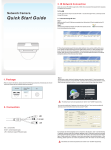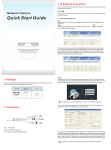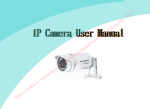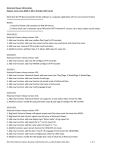Download IP-CAMERA USER MANUAL
Transcript
IP-CAMERA USER MANUAL Before use this product Before operation, we strongly advise users to read this manual and keep it properly for using later. This is product instructions not quality warranty. We may reserve the rights of amending the typographical errors, inconsistencies with the latest version, software upgrades and product improvements, interpretation and modification. These changes will be published in the latest version without special notification. When this product is in use, the relevant contents of Microsoft, Apple and Google will be involved in. The pictures and screenshots in this manual are only used to explain the usage of our product. The ownerships of trademarks, logos and other intellectual properties related to Microsoft, Apple and Google belong to the above-mentioned companies. IP-CAMERA USER MANUAL Table of Contents 1 Introduction.............................................................................................................................................................. 1 1.1 Summarization .................................................................................................................................................................................... 1 1.2 Check package content ......................................................................................................................................................................... 1 1.3 Connection ......................................................................................................................................................................................... 2 2 Installation ............................................................................................................................................................ 3 2.1 Install Dome ....................................................................................................................................................................................... 3 2.2 Connect IP-CAM to Ethernet network .................................................................................................................................................... 4 2.3 Install CMS ........................................................................................................................................................................................ 5 2.3.1 Installation Process ..................................................................................................................................................................... 6 3 IE Remote Access ................................................................................................................................................... 9 3.1 LAN .................................................................................................................................................................................................. 9 3.1.1 Access through IP-Tool ............................................................................................................................................................... 9 3.1.2 Directly access through IE ......................................................................................................................................................... 12 3.2 WAN ............................................................................................................................................................................................... 13 4 Remote Preview ................................................................................................................................................... 15 4.1 The remote preview interface .............................................................................................................................................................. 15 4.2 Record playback ................................................................................................................................................................................ 16 4.3 Right-click function ........................................................................................................................................................................... 16 4.4 Snap pictures: ................................................................................................................................................................................... 17 5 Remote Live Surveillance ..................................................................................................................................... 19 5.1 Main Menu Setup .............................................................................................................................................................................. 19 5.2 System Configuration ......................................................................................................................................................................... 19 5.2.1 Basic Information..................................................................................................................................................................... 19 5.2.1 Date & Time configuration ........................................................................................................................................................ 20 5.2.2 SD Card.................................................................................................................................................................................. 20 IP-CAMERA USER MANUAL 5.3 Video Configuration ........................................................................................................................................................................... 21 5.3.1 Camera Configuration............................................................................................................................................................... 21 5.3.2 Video Stream........................................................................................................................................................................... 22 5.3.3 Time Stamp ............................................................................................................................................................................. 23 5.4 PTZ Configuration ............................................................................................................................................................................. 23 5.4.1 Protocol .................................................................................................................................................................................. 23 5.4.2 Preset ..................................................................................................................................................................................... 24 5.4.3 Cruise..................................................................................................................................................................................... 25 5.5 Alarm Configuration .......................................................................................................................................................................... 27 5.5.1 Motion Detection Area .............................................................................................................................................................. 27 5.5.2 Motion Detection Trigger .......................................................................................................................................................... 28 5.5.3 Motion Detection Schedule........................................................................................................................................................ 28 5.5.4 Alarm Input Trigger .................................................................................................................................................................. 29 5.5.5 Alarm Input Schedule ............................................................................................................................................................... 30 5.5.6 Alarm Out ............................................................................................................................................................................... 31 5.6 Network Configuration ....................................................................................................................................................................... 32 5.6.1 Port ........................................................................................................................................................................................ 32 5.6.2 Wired ..................................................................................................................................................................................... 32 5.6.3 IP Notify ................................................................................................................................................................................. 33 5.6.4 DDNS Configuration ................................................................................................................................................................ 34 5.6.5 UPNP ..................................................................................................................................................................................... 36 5.6.6 Mail Setting ............................................................................................................................................................................ 38 5.6.7 FTP ........................................................................................................................................................................................ 38 5.7 Advanced configuration ...................................................................................................................................................................... 39 5.7.1 User configuration.................................................................................................................................................................... 40 5.7.2 Security Configuration .............................................................................................................................................................. 42 IP-CAMERA USER MANUAL 5.7.3 Configure Backup & Restore ..................................................................................................................................................... 42 5.7.4 Reboot device .......................................................................................................................................................................... 43 5.7.5 Upgrade .................................................................................................................................................................................. 43 6 7 Video Search ........................................................................................................................................................ 45 Mobile Surveillance ............................................................................................................................................. 48 7.1 By Phones with Windows mobile ......................................................................................................................................................... 49 7.2 By Phones with Symbian .................................................................................................................................................................... 53 7.3 The operation method for IPhone mobile clients..................................................................................................................................... 56 7.4 The installation & operation methods for Android mobile clients .............................................................................................................. 64 7.5 Installation and operation Methods for BlackBerry Mobile phone Client ................................................................................................... 69 7.5.1 Installation instruction for BlackBerry Mobile phone Client ........................................................................................................... 69 7.5.2 Operation method for Blackberry mobile phone client ................................................................................................................... 71 8 9 10 Use method for IP-TOOL ..................................................................................................................................... 75 Q & A .................................................................................................................................................................. 79 Specifications ....................................................................................................................................................... 82 IP-CAMERA USER MANUAL 1 Introduction 1.1 Summarization This IP-CAMERA (short for IP-CAM) is designed for high performance CCTV solutions. It adopts state of the art video processing chips. It utilizes most advanced technologies, such as video encoding and decoding technology, complies with the TCP/IP protocol, SoC, etc to ensure this system more stable and reliable. This unit consists of two parts: the IP-CAM device and central management software (short for CMS). The CMS centralizes all devices together via internet or LAN and establishes a sound surveillance system to realize unified management and remote operation to all devices in one network. This product is widely used in banks, telecommunication systems, electricity power departments, law systems, factories, storehouses, uptowns, etc. In addition, it is also an ideal choice for surveillance sites with middle or high risks. 1.2 Check package content The pictures below are only for reference; Parts of our product can adjust focus. Please make the object as the standard. IP-CAMERA Quick Start Guide CD Screwdriver Screw & Spile Accessories IP-CAMERA Quick Start Guide Description The device without Lens The Brief instructions of the product CD Screwdriver Screwdriver/Spile/Plotting Sheet CD-ROM with software and manual A tool to adjust the stand For installing dome Plotting Sheet 1 IP-CAMERA USER MANUAL 1.3 Connection Video out: connect to monitor HP: connect to headphone MIC: connect to MIC DC12V: connect to power supply LAN: network port (support PoE power supply) Alarm NO:alarm out; connect to alarm output device Alarm COM: alarm out; connect to alarm output device. Alarm GND: connect to external sensor together with alarm in line Alarm In: connect to external alarm input device, like sensor RS 485: connect to speed dome and keyboard D+ positive pole; D- negative pole GND: grounding line Default: intersect with GND line to reset 2 IP-CAMERA USER MANUAL 2 Installation 2.1 Install Dome The installation steps of Dome Camera are as follows: Step 1:Loosen the screws with a hexagonal screwdriver and take down the back box shown as the right picutre. Step 3: Rotate the two sticks to adjust zoom and focus. Step 2:Paste the plotting sheet on the ceiling. Drill four holes and instert spiles in the ceiling as per the sheet. Use the screws to fix the bottomboard on the ceiling. Step 4:Tighten the screws and install the back box. Note: Only part of our products can adjust focus and zoom. Please take the real object as standard. 3 IP-CAMERA USER MANUAL 2.2 Connect IP-CAM to Ethernet network The connection of digital video server is show below. Monitor Headphone MIC Adapter Modem Hub WAN LAN Control Center Alarm Sensor Keyboard PTZ Fig 2-1 Connection User can connect the PC and IP-CAMERA in accordance with above picture. Before connecting, please connect external devices, and then connect the power. The connection step as shown as below: Step 1: Connect IP-CAM firstly. Step 2: Internet line connect to Internet transfer equipment or devices Step 3: Connect power cable to a power outlet. 4 IP-CAMERA USER MANUAL 2.3 Install CMS After the CDD IP-CAM connected to the Ethernet, user can remote monitoring and managing the device by using client software or IE browser. This chapter is the client software, which is the quick install guide of the CMS, the operation and monitor setting details please refers to CMS user manual in CD. Note: Before to install control center software in user’s computer, please make sure all anti-virus software in the computer closed so that CMS can install correctly. System requirement Supported Operating System: Operating system Comments Windows XP SP2 or most updated patch; Direct 9.0c or above Windows XP Windows Vista; Direct 10. c Windows Vista Window 7 Window 7 Ultimate Windows 2003 Windows 2003 serve or Directx 9.0c or above Windows 2000 Windows 2000 SP4 or Directx 9.0c or above Computer hardware requirement Please make sure the software running well and the computer is compatible : Recommended PC Specification – 4 channels Item CPU Memory HDD Specification Intel Pentium 3.0 GHz or AMD 3000+ 1GB 160GB 5 IP-CAMERA USER MANUAL Recommended PC Specification -9 channels: Item CPU Memory HDD 1GB 250GB Recommended PC Specification -16 channels: Item CPU Memory HDD Specification Intel Core 2 Duo 1.8 GHz or AMD Dual core 3800+ Specification Intel Core 2 Duo 2.2 GHz or AMD Dual core 3800+ 2GB 250GB Notice: The mentioned specifications are provided considering CIF real-time resolution. The AMD chip hyper-3800+ and X64 series are not tested. For real-time live view with CIF resolution, max 25 channels can be played concurrently. For real-time view with D1 resolution, max 6 channels can be played concurrently. 2.3.1 Installation Process 1. We would recommend that the anti-virus software is disabled before initiating the installation. In addition, the setting of your IE browser must be enabled to download ActiveX components. 2. Run the ‗Setup.exe‘ from software CD, the next menu will pop up; 6 IP-CAMERA USER MANUAL Figure2-2 Welcome menu Figure2-3 Choose the installation destination 3. The default installation destination folder is ―C:\Program Files‖, user could click ―Browser‖ button to change it. After selecting the destination, click ―Next‖ to enter the next step as Fig 2-4: 4. Click ―Next‖ to start installing as Fig 2-5: Figure2-4 Select a folder to install Figure2-5 The rate of installation progress 7 IP-CAMERA USER MANUAL 5. The installation is completed as Fig 2-6: Figure2-6 Completed menu 6. Click ―Finish‖ to complete setup, then user can see the icon of ―Control Center‖ on the desktop. 7. Double click CMS icon to start the software, the initial user name is ―system‖, and password is ―123456‖, user can change it in the corresponding chapter, the detail introduction refers to ―user manager‖ in user manual. If you just want to user IP-tool, there is no necessary to install CMS software. You can open the CD and find the IP-tool icon and double click it to run. 8 IP-CAMERA USER MANUAL 3 IE Remote Access User can connect IP-Cam through LAN or WAN. Here only take IE browser (6.0) for example. The details are as follows: 3.1 LAN In LAN, there are two ways to access IP-Cam: 1. access through IP-Tool; 2. directly access through IE browser. 3.1.1 Access through IP-Tool Step 1: Make sure the PC and IP-Cam are connected to the LAN and the IP-Tool is installed in the PC from the CD. Step 2: Use IP-Tool to modify the network of IP-Cam. Then, double click the software as shown below: icon on the desktop to run this After starting IP-Tool and clicking the IP-Cam in the list, user can check the information of IP-Cam. If user cannot confirm which one is himself, please shut off the electricity of the IP-Cam and then power on it. When shutting off the power, the 9 IP-CAMERA USER MANUAL device information will disappear. When powering on, the device information will emerge. Well, this device is the used device. Right click the device information and select ―network setup‖. Then the network setup window will pop up as shown below: For example, the network segment of this computer is 192.168.x under the local config table. So, please modify the IP address, Subnet Mask, Gateway of IP-Cam which must be in the same network segment with the computer. Take 192.168.6.22 for example. After modifying, please input the user name and password and then click ―OK‖ button to save the setting. Note: The default user name is: admin. The default password is: 123456. The new IP address of this device will display as follows after modification. 10 IP-CAMERA USER MANUAL Step 3: Use the IP-Tool to login the IP-Cam. Right-click the IP address and select ―browse with IE‖. Then the system will pop up the IE browser to connect IP-Cam as shown below. IE browser will auto download the Active X control. If the IE browser cannot download the Active X control, please refer to Q4 of Chapter 9. Finishing the installation of the Active X control, a login window will pop up. Input User name and password and then click ―OK‖ button to login. Note: User also can use the modified IP address of the IP-Cam. Input the IP address in the IE browser bar and then click ―Enter‖ to access IP-Cam. The default user name is admin. The default password is 123456. 11 IP-CAMERA USER MANUAL 3.1.2 Directly access through IE The network service is default as shown below: IP address: 192.168.0.201 Subnet Mask: 255.255.255.0 Gateway: 192.168.0.1 HTTP: 80 Data port: 9008 When use the IP-CAM for the first time, please connect the device with the above default settings. Step 1: Manual setup the IP address of the PC, the network segment should be as same as the default settings of IP-CAM. Right click ―My Network Places‖ icon on the desktopselect ―properties‖ as shown in the left figure. Right click ―Local Area Connection‖ at the pops up window, and then select ―property‖ as shown in the right figure. Select ―Internet Protocol (TCP/IP)‖ in the ―General‖ tabsclick ―properties‖manual input network address information of the PC in the pop up window, referring to the following figure: 12 IP-CAMERA USER MANUAL Step 2: Open the IE Browser, input the default address of IP-CAM and confirm, the IE browser will download Active X control automatically. If IE browser can‘t download Active X control, please refer to Q4 of chapter 9. Step 3: After downloading Active X control, the login dialog box will pop up as below: Step 4: input user name and password in the login dialog box and click ―OK‖ button to enter into the live interface refer to the following figure. User can manage and setup the IP-CAM, such as change IP address etc. 3.2 WAN a. Access through router or virtual server Step1: Connecting according to above steps in LAN; enter into System ConfigurationNetwork configurationBasic configuration to setup the port number refers to Fig 3-1: Step 2: Enter into System ConfigurationNetwork configurationIP configuration to change IP address refers to Fig 3-2: 13 IP-CAMERA USER MANUAL Notice: The steps above should be saved after the change of the port and IP address. Log back in the device with the saved setting. Fig 3-1 Port setup Fig 3-2 IP setup Step3: Enter into the router‘s management interface through IE browser; remap the IP address and port of IP-CAM in the ―virtual server‖. The name depends on the router. Refers to Fig 3-3: Fig 3-3 IP remap Step 4: Open the IE browser and input its WAN IP and http port to access. The following steps are as same as ―Step 2, 3 and 4‖ of Chapter 3.1.2 in LAN. 14 IP-CAMERA USER MANUAL 4 Remote Preview 4.1 The remote preview interface 1 3 5 7 9 11 Alarm icon Fix size Zoom in Full screen Playback talk 2 4 6 8 10 12 People icon Actual size Zoom out Start record Snap Enable audio Fig 4-1 remote preview interface When senor alarm is triggered, the alarm icon is blue. When motion detection alarm is triggered, the people icon is blue. Click icon, user can zoom in the preview image to suitable size, drag the cursor on the enlarged image to view suitable preview area; click icon, user can zoom out the enlarged image; click icon, user can full-screen the live image. Clicking icon will appear a save path window and the record file can save on user‘s PC Note: On Window 7 and Window Vista, user can not record or snap pictures until UAC function is disabled. Please refer to following steps: Start—Control panel—User accounts—Change user account control settings in which user needs to drag 15 IP-CAMERA USER MANUAL the scale to Always notify end and then click ―OK‖ button to save. 4.2 Record playback Click icon, and refer to Fig 4-2: Fig 4-2 record playback interface After selecting the record date, the record files will be displayed in the record file list box. User can double click a certain record file to playback or check a certain file. Then click Play button to do playback. User can do relating operation according to some buttons in the playback interface. 4.3 Right-click function Clicking right mouse will appear a pull-down list as below: 16 IP-CAMERA USER MANUAL Stream: This IP-CAM supports four streams: 1080P, 720P, VGA, QVGA . Turn off the live: click this item will close present live preview. Enable audio: enable remote audio transmission. Users can hear the audio from the IP-CAM. Full screen: the live preview picture will full-screen display. Double click or click right mouse to return to the previous interface. Online user: display user‘s list connect to the device System information: display the device information: device name, firmware version, software build date, kernel version and hardware version. Fig 4-3 Right key sub-menu 4.4 Snap pictures: 1. Select the picture number, and then click ―Snap‖ icon as shown in the Fig 4-4: 2. User can snap multiple pictures. Select the picture number from Frame pull down list box, such as 3, and tick off ―Title‖ and ―Time‖ to show capture title and time on the snap pictures simultaneously. Refer to Fig 4-5: 3. Click ―Browse‖ to set saving path; Click ―Save‖ to save pictures to HDD on the computer; Click ―Printer setup‖ to set the printer and print the snap pictures; drag the scroll bar to view all snapped pictures. 17 IP-CAMERA USER MANUAL Fig 4-4 Single snap Fig 4-5 Multi-picture snap 18 IP-CAMERA USER MANUAL 5 Remote Live Surveillance 5.1 Main Menu Setup User can remote setup the parameters of the device. Functions of remote configurations include: System Configuration, Video Configuration, PTZ Configuration, Alarm Configuration, Network Configuration, and Advance Configuration. User should firstly select the server at the menu list on the left, and then setup the relative parameters. When a user setup parameters of a certain device, other users can not setup this device. 5.2 System Configuration The ―System configuration‖ includes three submenus: Basic Information, Date & Time and SD Card. 5.2.1 Basic Information In the ―Basic Information interface, user can setup the device name and also can check the relative information of the server Setting steps: 1. Clicking the "Configuration" icon will appear the System configuration interface in the operation area. 2. Clicking the ―Basic Information "will pop up a window as shown in Figure 5-1: 3. Input the name of the device in the "Device name" text box. Fig 5-1 Basic Information config interface 4. Press the "Save" button to save the settings. Please refer to the following table for parameters and instructions of server basic configuration. 19 IP-CAMERA USER MANUAL Parameter Software version Software build date Kernel version Hardware version Mac Address Maximum number of user Device name Meaning The software of the device The software build date of the device The kernel version of the device The hardware version of the device MAC address of device Support max 6 users to access Name of the device. 5.2.1 Date & Time configuration Setting steps: 1. Enter into "system configuration" ―Date & Time‖ referring to Figure 5-2: 2. Select ―Modify Time ", user can self-define time. Choose the right "Time Zone" according to user‘s location. 3. User can also enable DST and set DST mode and time. 4. User can setup time by select the ―Synchronize with NTP Server‖. 5. Press the "Save" button to save the settings. Fig 5-2 Date &Time config interface 5.2.2 SD Card Setting steps: 20 IP-CAMERA USER MANUAL 1. Enter into "System Configuration" –―SD Card‖, referring to Figure 5-3: 2. Usage status: Blue pane means used; red pane means unused. 3. Press "Eject card" terminates writing data to SD card, and it can be ejected safely. Note: Using of SD card function should be coordinated with Motion alarm. When alarm is triggered (refer to 5.3 Alarm configuration for details), SD card snap picture can realize. Fig 5-3 system configuration—SD card interface 5.3 Video Configuration Camera Configuration includes three submenus: Camera Configuration, Video Stream and Time Stamp. 5.3.1 Camera Configuration Setting steps: 1. Enter into "Video Configuration "-- "Camera" interface as shown in Figure 5-4: 2. User can adjust Brightness, Contrast, Hue and saturation of the picture. 3. Select white balance mode. 4. Wide dynamic, sharpen, denoise, frequency and CVBS format are adjustable. 5. User also can enable the image mirror and image overturn function. 6. Press the "Save" button to save the settings. 21 IP-CAMERA USER MANUAL Fig 5-4 Camera configuration—basic configuration interface 5.3.2 Video Stream 1. Enter into "Video configuration"-- "Video Stream" to see a interface shown as Figure 5-5: 2. Select the resolution of the single frame image at the "Resolution" pull down list. 3. Select the quantity of video per second at the "Frame rate" pull down list. 4. Select the data stream type at the "Bit rate type" pull down list. 5. Set the video quality at the "Video quality" pull down list. 6. Press the "Save" button to save the settings. 22 IP-CAMERA USER MANUAL Fig 5-5 Video Stream 5.3.3 Time Stamp 1. Enter into "Video configuration""Time Stamp" to display the interface as shown in Figure 5-6: 2. Select Date Format to show in the live image. 3. Time stamp: time displayed in the live preview pictures. Four items can choose from: top left, top right, bottom left and bottom right. 4. Press the "Save" button to save the settings. Fig 5-6 Time Stamp 5.4 PTZ Configuration Configuration includes three submenus: Protocol Configuration, Preset Configuration and Cruise Configuration. 5.4.1 Protocol 1. Enter into "PTZ Configuration""Protocol" interface as shown in Figure 5-7: 23 IP-CAMERA USER MANUAL Fig 5-7 Protocol configuration interface 2. Tick off ―Enable/Disable PTZ Config‖, and then reboot IE client side, the PTZ control panel will be displayed on the live interface. 3. Select the protocol of the PTZ device at the "Protocol" pull down list. 4. Input address of the PTZ in the "Address" textbox. 5. Select baud rate of the PTZ in the "Baud rate" pull down list. Note: For the settings of protocol, address and baud rate please refer to the user manual of the PTZ setting. 5.4.2 Preset 1. Enter into "PTZ Configuration""Preset" to see a interface as shown in Figure 5-8: 2. Click Add button to add preset point into the Available position list. 3. Select the preset point needs to be set in the pull down list of the Available position; click Go to button the speed dome will move to this preset point; click Delete button to delete checked preset point. 4. After finishing setting, click Save button to save the settings. Note: The explanations of the PTZ control buttons in the preset configuration interface please refer to Chapter 4.3 PTZ Control. 24 IP-CAMERA USER MANUAL Fig 5-8 Preset configuration interface 5.4.3 Cruise 1. Enter into "PTZ Configuration""Cruise " to display a interface as shown in Figure 5-9: 2. Click ―Add‖ button to pop up a window as Fig 5-10. Input the cruise line name manually; click ―Add Preset‖ button to setup the preset list, time and speed in the Add Preset dialog box. Select one preset and click ―Modify‖ button to change the related information, click ―Delete‖ button to delete this preset point. 3. Select a cruise in the cruise configuration interface and click ―Modify‖ button to change the related information. Click ―Preview‖ button to check the related information of this cruise and click ―Delete‖ button to delete this cruise. 4. Press the "Save" button to save the settings. 25 IP-CAMERA USER MANUAL Fig 5-9 Cruise configuration interface Fig 5-10 Add cruise line Fig 5-11 Add preset 26 IP-CAMERA USER MANUAL 5.5 Alarm Configuration Alarm configuration includes six submenus: Motion Detection Area, Motion Detection Trigger, Motion Detection Schedule, Alarm Input Trigger, Alarm Input Schedule and Alarm out. 5.5.1 Motion Detection Area 1. Enter into ―Alarm configuration"--"Motion Detection Area" to see a interface shown as Figure 5-12: 2. Move the "Sensitivity" scroll bar to setup the motion trace sensitivity. 3. Tick off the "Add‖, press the "Ctrl" button and move mouse to select the motion detection area; Select ―Erase‖ the mouse to clear all motion detection area. 4. Press the "Save" button to save the settings. and move Fig 5-12 alarm configuration-- motion detection interface 27 IP-CAMERA USER MANUAL 5.5.2 Motion Detection Trigger 1. Enter into ―Alarm Configuration"-- "Motion Detection Trigger" to display a interface as shown in Figure 5-13: 2. Tick off "Enable alarm" check box, all functions under this interface will be activated and then select alarm out 3. Tick off "Trigger snap‖. When the alarm is triggered, it will snap automatically. Note: the triggered snap pictures are saved in SD card; please make sure the card is inserted into the card slot properly. 4. Trigger Email: tick off ―Attach picture‖ and select email addresses in the ―Receival email address‖ text box(Email address shall be set first in the Mail config interface).Then the triggered snap pictures will be sent into those address. User also can define the subject and content of the email. 5. Trigger FTP: tick off ―uploading picture‖. Then the triggered snap pictures will be sent into FTP server address. Note: Please refer to FTP configuration chapter for more details. 6. Press the "Save" button to save the settings. Fig 5-13 alarm configuration—motion alarm interface 5.5.3 Motion Detection Schedule Enter into ―Alarm configuration"-- "Motion Detection schedule" interface as shown in Figure 5-14: Week schedule User could set the alarm time from Monday to Sunday for alarm everyday in one week. Note: The lengthwise means one day of a week; the rank means 24 hours of a day. Mouse clicks on the pane to set the alarm hours. Green means selected area. Blank means unselected area. 2."Add": add the schedule for a special day. 3."Erase": delete holiday schedule 28 IP-CAMERA USER MANUAL Note: The triggered snap picture is saved in SD card; please insert the SD card into the card slot. Day schedule User could set alarm time for alarm in some time of special day, such as holiday. 1. Select a special date at the "Date" pull down list, press "Add" button to add that date to the list box on the right side, and then move the scroll bar to set the schedule of that day. 2. Select a date in the list box on the right side, and press "Erase" to remove the schedule on that day. Press the "Save" button to save the settings. Note: Holiday schedule is prior to Week schedule. Fig 5-14 Motion detection schedule interface 5.5.4 Alarm Input Trigger 1. Enter into ―Alarm Configuration""Alarm Input Trigger" to see a interface as shown in Fig 5-15: 2. Select the sensor at the "Sensor" pull down list, and set the sensor name and alarm type: NO and NC optional. 3.Select Alarm holding. 4. Tick off "Enable alarm" check box. All functions under this interface will be activated. 5. Tick off "Alarm output" in the "trigger alarm out‖ text box and then it will be triggered sensor alarm if the device connected to an alarm. Tick off "Trigger snap‖: when trigger alarm out, it will snap pictures. 29 IP-CAMERA USER MANUAL Note: the triggered snap pictures are saved in SD card; please make sure the card is inserted into the card slot properly. 6. Trigger Email: tick off ―Attach picture‖. Select email addresses in the ―Receival email address‖ text box (E-mail address shall be set first in the Mail Config interface). Then the triggered snap pictures will be sent into those addresses. User also can define the subject and content of the email. 7. Trigger FTP: tick off ―uploading picture‖, the triggered snap pictures will be sent into FTP server address. Note: setup details for FTP please refer to Chapter 5.7 Notification configuration FTP configuration. 8. Trigger PTZ: tick off ―To preset‖ check box and select the preset point at the pull down list, when trigger alarm, the camera will move to the preset point; tick off ―Start cruise‖ check box and select the cruise line at the pull down list, when trigger alarm, the camera will move to the cruise line. 7. Press the "Save" button to save the settings. Fig 5-15 Alarm Input Trigger 5.5.5 Alarm Input Schedule Enter into ―Alarm Configuration"―Alarm Input Schedule‖, refer to Figure 5-16: 1. Select the sensor which needs to setup the alarm parameter at the "Sensor" pull down list. 2. The following setup steps are similar with Motion Detection Schedule‘s. Please refer to Chapter 5.5.3 for more details. 30 IP-CAMERA USER MANUAL Fig 5-16 Alarm Input Schedule 5.5.6 Alarm Out 1. Enter into ―Alarm configuration""Alarm output" refers to Figure 5-17: 2. Select alarm holding time and alarm name at the "Alarm out‖ and ―Alarm holding time‖ pull down list box respectively. 3. Press the "Save" button to save the settings. Parameter Meaning Alarm out The alarm equipment which is connected to the device Alarm The holding time of the alarm output after triggerring.5s, holding time 10s, 20s, 30s, 60s, 2minutes and always optional. Fig 5-17 alarm configuration—alarm out setting interface 31 IP-CAMERA USER MANUAL 5.6 Network Configuration Network configuration includes seven submenus: Port, Wired, IP Notify, DDNS Config, UPNP, Mail Setting and FTP. 5.6.1 Port 1. Enter into "Network configuration"--"Port" to see the interface as shown in Figure 5-18: 2. Input port number for IE access in the "HTTPPort" textbox. 3. Input the port number for audio & video transmission in the "Data Port" textbox. Fig 5-18 Port interface 5.6.2 Wired 1. Enter into "Network Configuration""Wired" to see a tab shown as Figure 5-19: 2. There are two Options for setup IP: obtain an IP address auto by DHCP protocol and use the following IP address, user can choose one of options for requirements. 3. Use the following IP address: display the IP address, subnet mask, gateway and DNS of the device. 4. PPPOE: User needs to manual input the user name and password for dial-up internet. Firstly, user needs to login IE clients, then enter into user name and password of PPPoE, save the setting and exit. Secondly, setup IP address change notice. Thirdly, connect with Modem, then the device will dial-up internet automatically. 6. Press the "Save" button to save the settings. 32 IP-CAMERA USER MANUAL Fig5-19 Wired interface 5.6.3 IP Notify 1. Enter into ―Network Configuration‖‖IP Notify‖ to see a tab as shown in Fig 5-20. 2. If the ―Enable notifying change of IP‖ is selected, when the IP address of the device is changed, a new IP address will be sent to the appointed mailbox automatically; If ―FTP‖ is selected, when the IP address of the device was changed, a new IP address will be sent to FTP server. Fig 5-20 IP Notify interface 33 IP-CAMERA USER MANUAL 5.6.4 DDNS Configuration 1. Enter into "Network Configuration""DDNS Configuration" tab as shown in Figure 5-21: Note: The steps to band a domain name for video surveillance server are as follows. Firstly, register a user name and a password to log on the website of service supplier, and then apply for a domain name online for the server. After that, users can visit the server through inputting the domain name at IE terminal. Fig 5-21 DDNS configuration interface 2. Press the "Save" button to save the settings. Please refer to the following table for parameters and instructions of DDNS configuration. Parameter DDNS server User name Password Meaning Address of the website which provided by domain name supplier. The optional: www.dns2p.net , www.88ip.net ,www.meibu.com ,www.dyndns.com, www.no-ip.com 和 www.3322.org Log in the website of domain name supplier Log in the website of domain name supplier 1. Apply the Domain Name (Take dns2p for example) 34 IP-CAMERA USER MANUAL (1) Register in the Web Step 1: Fill in the blank of IE address with ‗www.dns2p.com‘. Step 2: Click to enter the website. Step 3: Click "New User" in the right of homepage to register. For example: User ID is ‗abc‘, and password is ‗123456‘. The register dialog display as below: (2) Login Step 1: Return to homepage after registering successfully. Step 2: Click "Account Manager" on the right of homepage to login. Step 3: Input the username and password with the information that you have registered. Step 4: Click "Enter" key after filling in the textbox. Fig 5-22 Register dialog box Fig 5-23 Log in (3) Domain Setup Step 1: Click "Domain Management" on the left to set the domain. Fig 5-24 Domain setup 35 IP-CAMERA USER MANUAL Step 2: Input the domain in the textbox. For example, you set ‗CMOS IP-CAMERA‘ as the domain. Step 3: Click "Submit" button, the system will pop up a dialog box to show that the domain is added successfully. Note: Time of probationary period is one month. If user wants to use it continuatively after one month, please Step 4: click "Buy Now" in the right of homepage to pay for it. 2. Setup in the CMOS IP-CAMERA ⑴ DOMAIN Domain is set in ‗1. Apply the Domain Name‘. According to the example above, the domain is ‗WWW.CMOS IP-CAMERA.dns2p.com‘. ⑵ USER ID Username of registered which is set in ‗(1) Register in the Web‘. According to the example above, user ID is ‗abc‘. ⑶ PASSWORD Password is set in ‗(1) Register in the Web‘. According to the example above, password is ‗123456‘. Note: If the connection fails, press the "INFO" button. Now the system will display: ‗DDNS NONE‘. Then you need to check network and information above and try again. 3. Application Connect CMOS IP-CAMERA to the Network Client. Step 1: After popping up the login interface, fill in "Server" textbox with ‗*.dns2p.com‘ to visit the Network Client of the CMOS IP-CAMERA. The domain set in ‗(3) Domain Setup‘. According to the example above, fill in "Server" textbox with ‗CMOS IP-CAMERA.dns2p.com‘. Step 2: Click "save" button to save the above setting. 5.6.5 UPNP Enter into ―Network Configuration‖ ―UPNP‖ interface as shown in Fig 5-25. Select ―Enable UPNP‖ and then input friendly name. 36 IP-CAMERA USER MANUAL Fig 5-25 UPNP interface Enable UPNP Double-click the ―My Network Places‖ icon on the desktop in PC and select ―Show icons for networked UPnP devices‖ in the ―Network Tasks‖ list box. Then a information window will pop up. Click ―YES‖ button to see a ―Windows Components Wizard‖ dialog box pop up as shown below. Then press ―Next‖ to continue. After finished the installation of configuring components, the UPnP icons will display. Users can double-click certain icon to connect the remote surveillance login interface through IE. If ―Show icons for networked UPnP devices‖ can‘t display in the ―Network Tasks‖ list box, please follow the below operation: Click ―Tools‖-- ―Folder options‖ Tick off the ―Show common tasks in folders‖ in the ―Tasks‖ check box, UPnP icon will display. 37 IP-CAMERA USER MANUAL 5.6.6 Mail Setting Enter into ―Network Configuration‖ ―Mail Setting‖ interface. Please refer to Figure 5-26 1. From Email: sender‘s e-mail address 2. User name and password: sender‘s user name and password 3. Server address: SMTP name of sender 4.Select the secure connection type at the Secure Connection pull down list according to user‘ actual needs 5. Receival email address list: add email address into the list 6. Receival email address: receiver‘s e-mail address 7. After all parameters setup, user can click ―Test your account settings‖. If email sent successful, a ―Test Successful‖ window will pop up, if not, users can try other email addresses or check the setting. Fig 5-26 Mail setting interface Notice: If user change the static IP into PPPoE and select mailbox, there will be an e-mail sent to users’ mail box for notify a new IP address. 5.6.7 FTP Enter into Network ConfigurationFTP interface; please refer to Figure 5-27: 38 IP-CAMERA USER MANUAL Fig 5-27 FTP setting 1. Add: Click Add button to input FTP server‘s server name, address, port number, user name, password, and upload path, click OK to confirm the setting. Refer to Fig 5-28: 2. Modify:User can click this button to change some information of the FTP server 3. Delete:Select certain FTP account; Click this button to delete this account 4. Test :Select certain FTP account; Click this button to test its valid or not. Please refer to the following table for parameters and instructions of FTP configuration. Parameter Fig 5-28Add Server name Server address Port User name Password Path Meaning The name of the FTP server The address of the FTP server The port number of the FTP server The user name of the FTP server The password of the FTP server The save path for FTP files 5.7 Advanced configuration Advanced configuration includes five submenus: User Configuration, Security Configuration, Configure Backup & Restore, Reboot and Upgrade. 39 IP-CAMERA USER MANUAL 5.7.1 User configuration Enter into "User Configuration" interface referring to Figure 5-29: Add user: 1. Clicking "Add" button pops up "Add user" dialog box. Please refer to Figure 5-30: 2. Input user name in "User Name" textbox (only letters). 3. Input characters in "Password" and "Confirm Password" textbox (letters or numbers). 4. Input the MAC address of the PC in "Binding MAC address" textbox. Fig 5-29 User configuration interface Fig 5-30 Add user dialog box Note: After bind physical address to the IP-CAM, user can access the device on this PC in network only. If the MAC address was ―00:00:00:00:00:00‖ which means it can be connected to any computers. 5. Click ―OK‖ button and then the new added user will display in the user list. Modify user: 1. Select the user which needs to modify password and physical address in the user configuration list box. 2. Clicking ―Modify‖ button will pop up ―Modify user‖ dialog box as shown in Figure 5-31: 3. Input original password of this user in the ―password‖ text box. 4. Input new password in the ―New password‖ and ―Confirmation‖ text box. 40 IP-CAMERA USER MANUAL Fig 5-31 Modify user dialog box 5. Input computer‘s physical address which is used to access the server in the ―User PC MAC‖ text box. 6. Click ―OK‖ button to modify user‘s password and binding MAC address successfully. Delete user: 1. Select the user which needs to delete in the user configuration list box. 2. Clicking ―Delete‖ button will pop up a confirm dialog box. Then click ―OK‖ to delete the user. Note: The default super administrator cannot be deleted. Parameter User Name User Type Binding MAC address Password Confirm Password Meaning User name to operate the logon client end Type of users, normal user, advanced user and super administrator The MAC addresses of user access the server which should setup according to actual MAC address of server. Password to log in the client terminal Password to log in the client terminal 41 IP-CAMERA USER MANUAL 5.7.2 Security Configuration Enter into Advanced ConfigurationSecurity Configuration to see a tab shown in Figure 5-32: 1. Tick off ―Enable IP address‖ check box, select ―Deny the following IP address‖, input IP address in the IP address list box and click ―Add‖ button. Then this IP address will display in the list box; the operation step of ―Allow the following IP address‖ is the same with ―Deny the following IP address‖ 2. Select the IP address which needs to be deleted from the IP address list box and click ―delete‖ button to delete that IP address. 3. Tick off ―Enable MAC address‖ check box, select ―Deny the following IP address‖, input MAC address in the MAC address list box and click ―Add‖ button. Then this MAC address will display in the list box; the operation step of ―Allow the following MAC address‖ is the same with ―Deny the following IP address‖. 4. Select the MAC address which needs to be deleted from the MAC address list box and click ―delete‖ button to delete that MAC address. Fig5-32 security configuration interface 5. Click "save" button to save the above setting. 5.7.3 Configure Backup & Restore Enter into Advanced configurationConfigure Backup & Restore Interface, referring to Figure 5-33. 42 IP-CAMERA USER MANUAL Import & Export Configuration: User can import or export the setting information from PC or to device. 1. Click ―Browse‖ to select save path for import or export information on PC. 2. User can import or export all setting information to PC, but those two settings ―user configuration‖ and ―network configuration‖ are exceptional. Default Configuration Click ―Load default‖ button to restore all system settings to default status. Fig 5-33 Backup and restore configuration interface 5.7.4 Reboot device Enter into Advanced configuration—Reboot device to see a interface as shown in Figure 5-34: Click ―Reboot device‖ button to reboot the device. Fig 5-34 Reboot device interface 5.7.5 Upgrade Enter into Advanced Configuration—Upgrade interface shown as Figure 5-35: 1. Click ―Browse‖ button to select the save path of the upgrade file 43 IP-CAMERA USER MANUAL 2. Click ―upgrade server firmware‖ button to start upgrading the application program 3. The device will restart automatically 4. After you successfully update the software, click ―OK‖ button to close IE and then re-open IE to connect IP-Cam. Fig 5-35 Upgrade interface Notice: user can’t disconnect to PC or close the IP-CAM during upgrade 44 IP-CAMERA USER MANUAL 6 Video Search Click ―picture‖ icon and search the images which saved in the SD card referring to Figure 6-1: Fig 6-1 Picture search list box 1. Select date in the ―calendar‖, tick off ―motion detection‖ relatively and click ―search‖ button; the triggered snap pictures will be displayed in the list box. 2. Double click a filename or select a filename and then click ―view‖ button in the list box to view snap pictures. Refer to Figure 6-2: 45 IP-CAMERA USER MANUAL Fig 6-2 View pictures interface Definitions of function buttons: 46 IP-CAMERA USER MANUAL Item 1 2 Buttons Explanations Close: Select certain picture and click this button will close this preview picture. Close all: click this button will close all preview pictures 10 Save: click this button, select the save path of the picture file on PC to save this preview picture Save all: click this button, select the save path of the picture files on PC to save all preview pictures Fit size: click this button, the preview pictures will fit on screen Actual size: click this button to display the actual size of the preview pictures (for user‘s requirements) Zoom in: click this button to amplify the preview picture, user can drag cursor to view request areas. Zoom out: click this button to zoom out amplified preview picture Slider play: click this button to play preview pictures on the mode of slider Stop: click this button to stop slide show 11 Play speed: play rate of the slide show 3 4 5 6 7 8 9 47 IP-CAMERA USER MANUAL 7 Mobile Surveillance This IP-CAM supports mobile surveillance by smart phones with Windows mobile, Symbian and Android. Below are the details of the compatible OS version. Please check the operation system version of mobile before use; and connect the IP-CAM to Internet. Operation system Windows Mobile 2003 for Smartphone Windows Mobile 2003 for Pocket PC Windows Mobile 5.0 for Smartphone Windows Mobile 5.0 for Pocket PC Phone Edition Windows Mobile 5.0 for Pocket PC Windows Mobile 6 Standard Windows Mobile 6 Professional Windows Mobile 6 Classic Symbian S40 Symbian UIQ Symbian S80 Symbian S60 3rd Edition-Symbian OS v9.1 Symbian S60 3rd Edition with FP1-Symbian OS v9.2 Symbian S60 3rd Edition with FP2-Symbian OS v9.3 Symbian S60 5th Edition-Symbian OS v9.4 Symbian S60 5.1 Edition-Symbian OS v9.5 Compatibility not supported supported not supported supported supported not supported supported supported not supported not supported not supported supported supported supported supported supported 48 IP-CAMERA USER MANUAL 7.1 By Phones with Windows mobile Step1: Firstly activate the network access on mobile phone and then run ―Internet Explorer‖. Input the server‘s address and the connection is built up shown as below: Step2: Click on the software name. A dialog box pops up: Step3: Run this software after installed, the login interface will popup Enter server‘s IP address (or domain name), user name and password Click ―Remember server‖ to save the setting; click button can quick input saved server address, user name and password. Work offline: view local record and snap 49 IP-CAMERA USER MANUAL Main interface [Local play] [Image View] [History log] [Favorites] [Live View] [Remote Set] [Local Set] [Information] [Help] playback record file View images Log record Server list View the live Not available Software setting Device information view Software help Live view 50 IP-CAMERA USER MANUAL PTZ, click to switch to the second picture. Snap Record Talk Live audio Full screen Hide Return Upward rotates the PTZ Downward rotates the PTZ Leftward rotates the PTZ Rightward rotates the PTZ Stop rotating the PTZ Zoom in/ Focus in/ Iris Add Zoom out/ Focus out/ Iris Sub Cruise Preset Select the preset point Set the cruise line Image view Record playback 51 IP-CAMERA USER MANUAL Play/ pause Stop Full screen Return to record file interface Click the record file to playback. Server list Configuration interface 52 IP-CAMERA USER MANUAL Main parameters for mobile phone video configuration. Select Sound Alarm: When Video Loss/Sensor/Motion happens,sound alarm will be triggered. Select shake Alarm. When Video Loss/Sensor/Motion happens,shake alarm will be triggered. Select backlight Alarm: When Video Loss/Sensor/Motion happens, backlight alarm will be triggered. Reserved disk: Reserved SD Card disk space, when the disk space is less than setup value, the video will be stopped. Video clip size: Single video size. When the video size is greater than setup value, change another video files Recycle: continuous record. Remove all former recorded files: delete all record files of the current device. Buffering time: Buffering time of video display. 7.2 By Phones with Symbian Please use the smart phones with symbian version supported by this unit. Step1:Firstly enable the network access on mobile phone. Then run Web browser. Step2:Input the IP-Cam server‘s IP address in a new-built bookmark. Click this bookmark to connect to the IP-Cam. 53 IP-CAMERA USER MANUAL Step3:A welcome window will pop up and requires a package. Click the software name to download. Step4:A security windows will pop up after downloading and ask if install the package. Click YES to install. Step5:A Scam shortcut icon appears on the system menu after finished. Step6:Run Scam program. It will enter a function interface. Live view: to do mobile live view. Image view: to check the pictures snapped in live view. System setting: Login setting and Alarm setting. Help: function indication and help. Step7:Click System setting--->Login Setting to enter login interface. Step8:Input the server‘s address, ID and password respectively. Then save. 54 IP-CAMERA USER MANUAL Notice: About Access point, there may be different access points in different countries or from service providers. Step9:Enter Live View, it will connect the server and display pictures. Notice: User name and password here are the same with that used on the IP-Cam. The default is admin and 123456. Step10:In Live View, users can do snapshot, change channels and control PTZ. 55 IP-CAMERA USER MANUAL 7.3 The operation method for IPhone mobile clients 1. Install through Iphone. Step 1: Open App Store function of Iphone. Step 2: Enable ―search‖ function to search ―SuperCam‖. Step 3: Click SuperCam, enter into ―introduce‖ interface and then click ―FREE‖, it will change into ―INSTALL‖. Step 4: Input iTunes Store password and then click ―OK‖, the software will be installed automatically. Note: if it was the first time for user to operate, please enter user ID; if there is no Store account, user needs to apply one. 56 IP-CAMERA USER MANUAL 2. Install through PC. Step 1: Install iTunes store in PC and then login Step 3: Enable ―search‖ function to search ―SuperCam‖ Step 2: Connect iPhone and PC Step 4: Click ―free application‖ button 57 IP-CAMERA USER MANUAL Step 5: Input apple ID and password, then click ―acquire‖ Step 6: Tick off ―synchronously apply program‖ and ―SuperCam‖, and then click ―apply‖ button Operation Instruction for Iphone 58 IP-CAMERA USER MANUAL 1. Login interface Enter server‘s IP address (or domain name), user name and password. Click ―Remember server‖ to save the setting; Click button can quickly input saved server address, user name and password. 2. Live Interface Image view Playback record file System configuration Device information view Server list information Logoff and return to login interface 3. Single channel Snap Record Audio Talk PTZ PTZ Interface 59 IP-CAMERA USER MANUAL Button Cruise 4. Description Upward rotates the PTZ Button Description Downward rotates the PTZ Leftward rotates the PTZ Rightward rotates the PTZ Stop rotating the PTZ Zoom In/Focus In/Iris Add Zoom Out/Focus Out/Iris Sub To enter into the next interface To return to the previous interface Set the cruise line Preset Speed select the preset point Rotate speed of the PTZ Image view interface After the image is snapped, you can click icon to enter into the image view interface. Select the image and click it to amplify this image. Then you can copy or delete the image. Click ‗close‘ button to return to the previous interface. 60 IP-CAMERA USER MANUAL 5. Record Playback interface Click icon to enter into the playback interface. Then click ‗Search‘ button, select the time to playback and click button. Now you can see the local file list. Select a file and click play button to playback. You can also copy or delete the file. Finally, click ‗Close‘ button to return to the previous interface. 61 IP-CAMERA USER MANUAL 6. Server list Interface Click button to enter into server list interface. You can click icon to add a server list. After you add the list, you can click edit the server information and click icon to icon to delete this server information. 62 IP-CAMERA USER MANUAL 7. Config interface Main parameters for mobile phone video config Record file clip size: Single video size. When the video size is greater than setup value, change another video files Reserved disk space: Reserved SD Card disk space, when the disk space is less than setup value, the video will be stopped Remember display order: Choose whether to remember display order or not. Default display mode: Set the display mode to the default value. You can also enable/disable auto reconnect and select the connection check time. Audio Alarm: If enabled, when Video Loss/Sensor/Motion happen,sound alarm will be triggered 8. Information View Interface In this interface, you can check the system information, such as device name, device ID, etc. 63 IP-CAMERA USER MANUAL 7.4 The installation & operation methods for Android mobile clients Software Installation Step 1: run Google Market program Step 3: press ―Install‖ button Step 2: search ‖SuperCam‖ Step 4: click ―OK‖ button 64 IP-CAMERA USER MANUAL Step 5: user can view the download and install process in notifications; finished download, the software will install automatically. Login Enter into server‘s IP address (or domain name), user‘s ID and password. Click ―Remember server‖ to save the setting; click button can quick input saved server address, user name and password. 65 IP-CAMERA USER MANUAL Main menu 【Playback】 【Log】 【Live】 【Information】 【Image】 【Server List】 【Settings】 【Help】 【Logoff】 playback record file log record live view device information view image view device list software setting software help center logoff and return to login interface Live view Item Return Description PTZ, click to switch to PTZ interface Item Description Hide Snap Record Talk Live audio Return to the previous interface Image view 66 IP-CAMERA USER MANUAL The first picture The previous picture Next picture The last picture Zoom in Zoom out Delete picture Record playback Play/pause Stop Fast forward Slow playback Click Playback icon in the main menu interface to enter into the playback interface. Then choose the channel and file. Double click the file name to playback. 67 IP-CAMERA USER MANUAL Server list Add a server list Modify a server list Delete a server list Return Return to the previous interface Config interface If Audio alarm is enabled, when Video Loss/Sensor/Motion happen , sound alarm will be Alarm setting triggered; If shake Alarm is enabled, when Video Loss/Sensor/Motion happen , shake alarm will be triggered. Storage setting Display setting User can setup the relevant parameters of mobile video. This function can be valid only insert SD card. User can setup display order or display mode. Information view 68 IP-CAMERA USER MANUAL In this interface, user can view the information of device and phone, such as device name, device ID, the software version of device or phone, etc. 7.5 Installation and operation Methods for BlackBerry Mobile phone Client 7.5.1 Installation instruction for BlackBerry Mobile phone Client 1. Open the browser of BlackBerry phone and enter sever address 2. Click ―SuperCam‖ to link 3. Click ―Download‖ button on the popup interface and the download progress will be shown. 69 IP-CAMERA USER MANUAL 4. Finished downloading, the software will be installed automatically. Note: If the software fails to download, please check in accordance with the following steps: 1. Check whether the network of mobile phone is normal or not 2. Check whether the IP-Cam server connect network normally or not 3. Modify the option of Browser Configuration. (1) Enter into Menu->Option->Browser Configuration; configuration referring to the following figure in the left. (2) Enter into Menu->Option->Cache Operations, clear up browser cache. Refer below picture in the right: Note:When the user uses the SuperCam software in the mobile phone with touch screen, there will be compatible problem. 70 IP-CAMERA USER MANUAL Solution: Enter into Options Menu->Advance options->Applications->SuperCam and click ―Disable Compatibility‖ button. This problem will be solved. 7.5.2 Operation method for Blackberry mobile phone client 1. Login Enter server‘s IP address (or domain name), user‘s ID and password. Click ―Remember server‖ to save the setting; click button can quick input saved server address, user name and password. 2. Main interface 71 IP-CAMERA USER MANUAL Playback Log Information Logoff Live 3. playback record file log record device information view logoff and return login interface live view Image Server List Help to Settings image view device list software help center software setting Live view Note: User can click Return button on the Blackberry phone to return the previous interface. 72 IP-CAMERA USER MANUAL Item Description 4. Description Click to enter into PTZ interface Full screen Snap Stop rotating the PTZ Hide Downward rotates the PTZ Upward rotates the PTZ Rightward rotates the PTZ Leftward rotates the PTZ Zoom Out/Focus Out/Iris Sub Zoom In/Focus In/Iris Add Preset Item Group Set the cruise line Select the preset point Server list 73 IP-CAMERA USER MANUAL 5. Software configuration 6. Information view In this interface, user can view the information of device and phone, such as device name, device ID, the software version of device or phone, etc. 74 IP-CAMERA USER MANUAL 8 Use method for IP-TOOL Updating through IP-Tool Note: Do not cut off power supply and internet when updating; If the device is unable to start because of the failure of upgrade, it needs to retrofit. First, acquire the IP-Tool from the supplier and then double click the IP-Tool icon to run this software. Then the device can be searched; if the device can‘t be searched, please check whether the PC and the device connect to the network or not. Click the device to check its detail information shown as below: When upgrading the software and kernel, the IP address of PC and device should be at the same network segment. If the network segment is different, user should change the IP address by right clicking the device and then select ―network 75 IP-CAMERA USER MANUAL setup‖. Modify IP address dialog box will appear as follows: Modify IP address and click OK button to exit the dialog box, IP-Tool will display the new IP address. Select the device; right click ―Update software‖ as below picture shows: Click ―Update‖ to start upgrading,the progress bar will display as below. When upgrading, please do not disconnect PC and the device and make sure the power is on. 76 IP-CAMERA USER MANUAL After finishing upgrading, a massage box will pop up as below: Click OK button to exit the update dialog box, and then the device will restart automatically. Select the device, right click it to select ―Update kernel‖ and then a dialog box will appear as below: 77 IP-CAMERA USER MANUAL Enter into Update Kernel interface dialog box, input admin in the User name text box, input 123456 in the Password text box, and click ―Browse‖ to select the Update file (mboot8180-8180), click ―Update‖ button to start updating. When upgrading doesn‘t disconnect PC to device, make sure the power is on. The update progress bar will display as below: After finishing upgrading, a message box will pop up. After a while, the device will restart automatically. 78 IP-CAMERA USER MANUAL 9 Q&A 1. Q: Forget password A:Joint the default line and GND line to reset. Note: Default IP: 192.168.0.201 User name: admin Password: 123456 2. Q:Cannot connect devices through IE browser A: Network doesn‘t connect well. Please check the connection and make sure it connected well. B: IP is not available. Reset the valid IP. C: Web port number has been revised: contact administrator to get the correct port number. D: Exclude the above reasons. Recover default setting by jointing the default line and GND line. Note: default IP: 192.168.0.201,mask number: 255.255.255.0 3. Q:IP tool cannot search devices. A:It may be caused by the anti-virus software in your computer. Please exit it and try to search device again. 4. Q:IE Cannot download ActiveX control. a. IE browser blocks ActiveX. Please do setup following below. ① Open IE browser. Click Tools-----Internet Options…. 79 IP-CAMERA USER MANUAL ② select Security------Custom Level….refer to Fig 4-1 ③ Enable all the sub options under ―ActiveX controls and plug-ins‖, refer to Fig 4-2 Fig 4-1 ④ then click ok to finish setup. b. Other plug-ins or anti-virus blocks ActiveX. Please uninstall or close them. Fig 4-2 80 IP-CAMERA USER MANUAL 5. Q:No sound A:Without connect audio input device. Please connect and try again. B: Without enable audio function at the corresponding channel. Please tick off AUDIO item to enable this function. 6. Q:Can’t connect to wireless A: Check the statues of wireless router. Please make sure the router is open B: Check the router and the device port. Please make the router setup is matched with device port. 7. Q: How to do when the device is unable to start normally when upgrading? If the device is unable to start normally when upgrading, please rename the files suffixed with .tar as updatepack.tar and copy it to the root directory of SD card. Restart the device and then the device will upgrade automatically from the SD card. After finishing upgrading, the user can search the IP address of IP Cam in the IP Tool. 81 IP-CAMERA USER MANUAL 10 Specifications Model Video compression Audio compression Image resolution Video resolution Frame rate Stream Audio Net Protocol LAN Remote control IR Range Protection Grade Client number PoE Power CMOS 2 Mega Pixel ICR IP Camera H.264 G711A 1080P ,720P,VGA,QVGA 1920x1080(1080P);1280x720(720P) 640x320 (VGA); 320x160(QVGA) Max30 fps 256kbps~12288kbps(Adjustable) 256kbps~6144 kbps(Adjustable) 128kbps~2560 kbps(Adjustable) 64kbps~1024kbps(Adjustable) 1-ch MIC input, 1-ch MIC output TCP/IP, DHCP, PPPoE, DDNS, SMTP, UPnP,RTSP,NTP 10/100M RJ45 IE browsing,remote control via CMS 30m IP66 Max six Option DC12V/1.5A 82












































































































